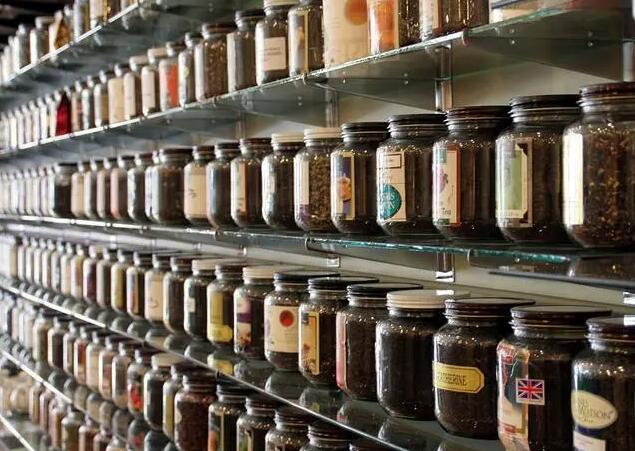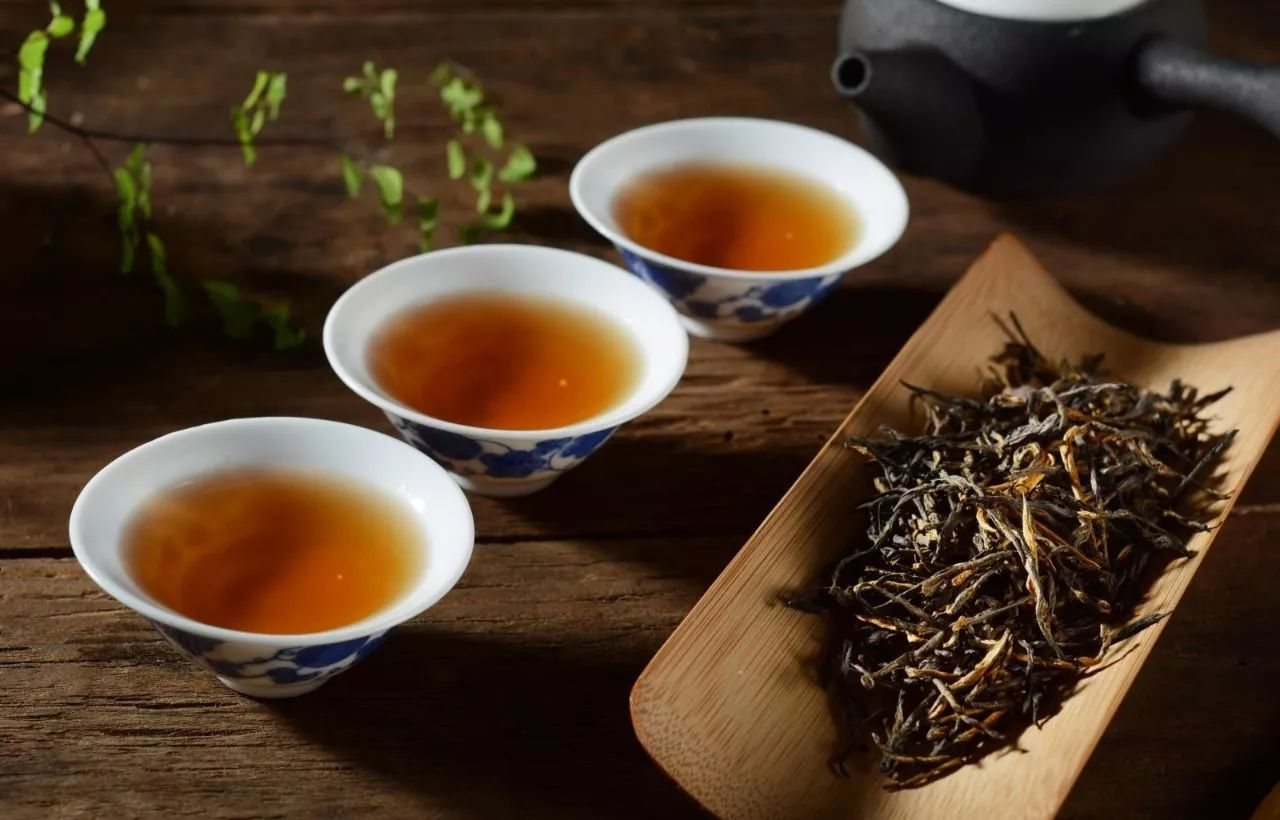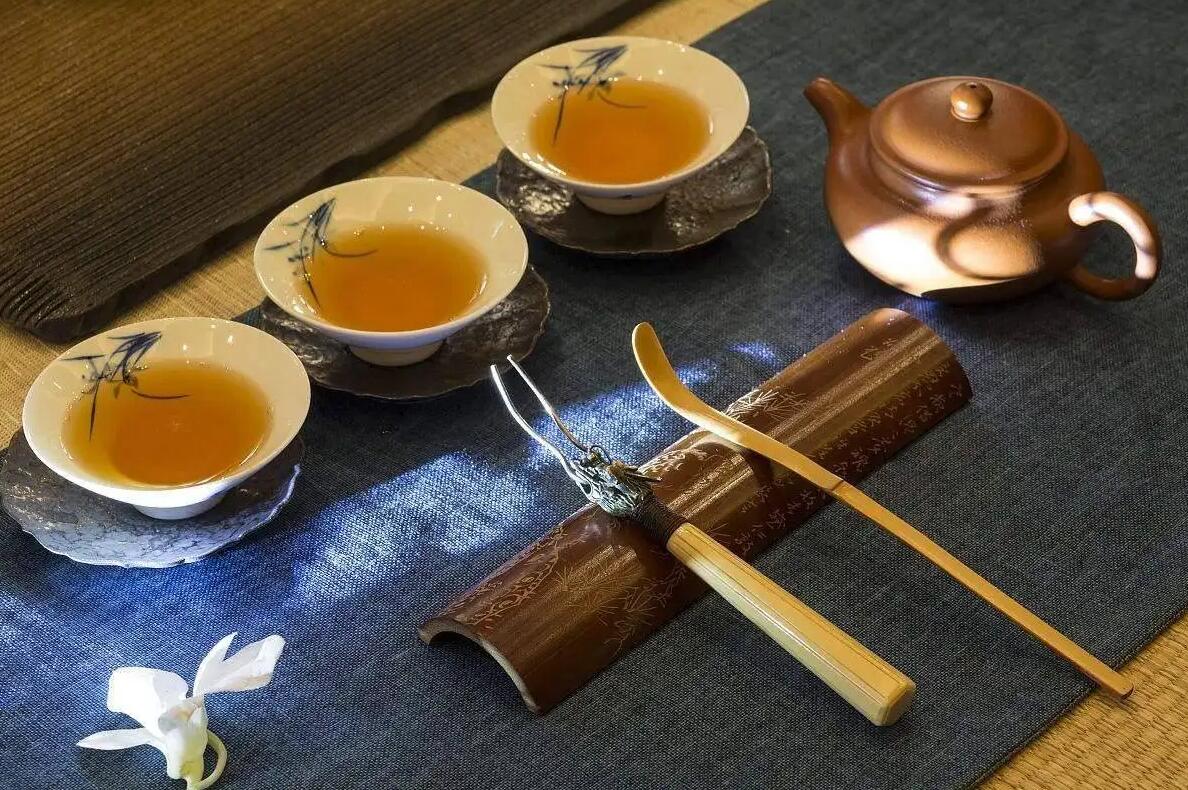All of these teas were provided by Henry Chou and Teacher He of "Hang Jia". Henry Chou has been selling tea and vintage tea sets in Malaysia for many years. His selfless promotion of tea culture and efforts to source the best teas by traveling to the farms in China are extraordinary. Hang Jia is a small shop in Taiwan where the very generous host will share anything from a rock tea to a vintage Puerh. Both were very supportive and offered the teas as research, without any question of compensation.
We gathered six of the best rock teas we could find and sat down to have a long weekend session. It was a nice excuse for everyone to visit, spend the night and drink some good teas for a couple days. Four of the teas were from the 2005 handmade production of Master Ling Ping Xang. Master Ling feels that rock teas should be aged at least a year to let the roasting mellow out. Otherwise one only tastes the roast, but after a year or two one can still enjoy the flavors of the roast and the leaves themselves. The other two teas from Hang Jia were both Da Hong Pao, one new and one aged from the 1990's. We therefore had a total of three Da Hong Pao teas to judge, two newer ones and one that was about ten years old. Of the newer ones, only Master Ling's was handmade. The other one from Hang Jia had been machine roasted, though other stages of the process were also done by hand. All of the scores below are based on an average of all the participants evaluations. They are based upon our feelings of Wuyi rock teas alone, and are therefore only a comparison of all the yan cha we've had in our lives, not all tea. We chose random comments for each of the teas, which we felt were descriptive, well-written and conveyed the essence of the tea best. It was a great experience to try so many rock teas with so many different flavors, aromas and feelings.
2005 Bai Ji Guan (White Cockscomb)
Leaves:
Dry - Small and slightly twisted leaves. They smell sweet with hints of chocolate.
Wet - Long and thin, they are still green and rich. Smell cooked but slightly sweet. Not all the leaves are whole. There are some bits and pieces.
Comments:
* The liquor smelled often of plums or peaches. The name makes sense in more ways than one, as I felt that it shared characteristics with white teas. There were nice sensations in the mouth and throat (cha yun), though I felt that the Qi was lacking. I wasn't impressed, overall, by this tea. In fact, I often caught myself wondering when we could move on to the next one.
* I feel that rather than develop over the course of the session, this tea is fickle. The flavors and aromas flip-flop in strength, then ultimately disappear. The Qi, Liquor and cha yun were all consistent, though not glorious. Of all the yan cha I've had this one was the most fascinating in the way it changed - flavors and aromas that seemed different enough to be distinct teas. When they were strong I loved them, and when the next steeping was poured and the tea had changed, I was disappointed.
* The tea tasted to me of oranges, with hints of chocolate. There was a slight bitterness in the aftertaste. Other times it left me feeling as though I had eaten something tart, like an unripened strawberry. The cha yun was great, causing me to salivate and coating the throat, though there was some dryness in the upper palate. The tea liquor had a nice, rich sheen. The Qi wasn't that great; it felt heavy and made me lightheaded.
2005 Rou Gui
Leaves:
Dry - Larger than the Bai Ji Guan. Long and twisted with hints of green. They smell deeper also, with a heavier roasting and more substance to them.
Wet - Long and green leaves. No cooked smell, only sweetness remained. They were all intact and displayed a much higher quality and grade than the first tea we had tried.
Comments:
* The flavor and aroma of this tea were really rather mellow. I tasted a tart berriness and some hints of spices. Sometimes it even reminded me of spices kept in large wooden barrels. There was more cha yun, especially on the lips and tongue. The Qi was a flowing, gentle Yin that made my whole body very comfortable. I enjoyed the way this tea made me feel very much.
* I gave this tea some lower scores in some categories, but I feel bad because I felt this tea was soft, sensual and very satisfying personally. But I wouldn't really drink this tea for its taste or aroma, which were too weak and unreachable in my opinion. I would, however, still buy this tea for daily use just based on the Qi.
* This tea smelled of ghee (clarified butter). It had a floral quality that was subtle, though it was somewhat bitter at times. The liquor was slightly oily and full, which was surprising because the taste was light. It had a long-lasting aftertaste (hui gan) that was also odd, because it stayed on the breath but in an indiscernible way that didn't really have a taste. I felt the tea mostly on my tongue, though occasionally on the upper palate and throat. The Qi was soft and Yin. These kind of teas often are so comfortable they make me sleepy. All in all, it was a pretty good tea for daily consumption, but not spectacular.
2005 Shui Xian
Leaves:
Dry - Much longer than the other teas we've had. They are slightly green with hints of red and brown. The smell is subtler, yet has more depth and presence than the other two teas so far.
Wet - The wet leaves are long and green. They never completely unfurled, though we don't know why. The wet leaves had a unique aroma, almost of pepper.
Comments:
* This tea tasted woodsy, with hints of pine nuts. Even the fragrance seemed nutty. It had very nice sensations (cha yun), especially on the upper palate and then coating the throat. The aftertaste was spicy and not always pleasant. The Qi was soft and gentle Yin, though not as comfortable as the Rou Gui.
* While I found the aromas and flavors of this Shui Xian enjoyable, they were too weak and the other facets of the tea - its liquor, sensations, Qi, etc. - were all only average. The good points were just the flavor and aroma, with none of the slight bitterness or sour flavor that occasionally appeared in the previous teas. It would be difficult to make this tea taste bad, yet the leaves seemed stressed to produce what little they did.
* This tea had a nice, delicate roast flavor with hints of berries and nuts. It smelled sweet, like honey dew. There were a lot of sensations, mostly after swallowing. The mouth and throat then felt coated. I sometimes also felt it on the palate and even teeth, but not with strength. The Qi was gentle and Yin, but more passive than the last tea. It moved in waves upwards from my midsection to my head.
2004 Da Hong Pao #1 (Hang Jia)
Leaves:
Dry - Mostly Bigger leaves with some smaller pieces. Smells fruity and sweet. The fragrance is rather gentle.
Wet - Long and thin, but didn't completely unfurl. The wet tea smells slightly cooked and not entirely pleasant.
Comments:
* This tea was sweet with hints of grass in the flavor. It was thicker and more full-bodied than the previous teas. It often tasted of peaches. There was some hui gan, and some sensations, mostly on the tongue. The liquor wasn't entirely clean, suggesting that something may have been off in the "kill-green" (sa cheen) phase of processing. The Qi was more Yang and less comfortable than the Rou Gui, which had the best Qi so far.
* This tea had the flavor and aroma of raisin bread, coupled with a strength in each steeping that impressed me. The toasty, dried-fruit aroma matched the flavor well. There was a sour note in the aftertaste that wasn't always pleasant. I felt the tea on the sides of my tongue. It sometimes left my mouth feeling dry, but I have often found this in Da Hong Pao teas.
* The flavor was roasted and the aroma was buttery and fruity. I felt the tea on the palate, and the sensations were sometimes not pleasant. It often made my mouth dry. It seemed to have a lot in common with the second and third teas.
2005 Da Hong Pao #2 (Master Ling Ping Xang)
Leaves:
Dry - Long and perfect leaves. All of the leaves are the same size and unbroken. It smells subtle and deep at the same time. The aroma is blissful and complete.
Wet - The long leaves were all unfurled and green. They appeared different than all the other teas, and when viewed together the eyes are automatically drawn to them. It smelled sweet with no hints of being cooked, which suggests that it can be re-boiled for more enjoyment.
Comments:
* This tea filled the mouth and throat with sensation (cha yun) that even overpowered the smell and taste. It tasted subtle, fruity and often tasted of wood. It smelled elegant, often of pears. The Qi was a deep Yin that was often overwhelming, more like an aged Puerh. I thought the tea was excellent.
* This was the most interesting of the Wuyi teas we've tasted so far. It had flavors and aromas I've never experienced before in a Wuyi tea. It tasted like nori (sweet seaweed) and was very well-balanced. Sometimes it seemed too subtle for me. Had the aroma and flavors been stronger, I would have ranked it way above all the others. As it stands, it is still the best so far.
* This tea presented sensations in the front of the tongue, upper palate and throat immediately. It clung to the mouth and throat and returned in the breath (hui gan). It tasted indefinably sweet. It did occasionally have a slight tartness in the aftertaste, though. The liquor was beyond the other teas, and the Qi was conspicuous and instantaneous, which is a characteristic of all superior teas. It pushed to the extremities, setting the flesh afire with tingling sensations. The Qi was Yin, but stronger than the others so far.
1990's Da Hong Pao #3 (Hang Jia)
Leaves:
Dry - These leaves are darker brown with some hints of red here and there. They smell deeper, with more of the roast coming forth. There are hints of nuts and spices all throughout.
Wet - Long and thin, they are all very much intact and unfurled. The tea is much darker wet than all the other varieties we have had so far.
Comments:
* The liquor was darker and redder than the others. The tea tasted deep and spicy with hints of berries. It was occasionally tangy and tasted as if it had been re-roasted during its aging period. It was sweet often and had nice cha yun. The Qi was more Yang, though not incredibly deep. I would drink this tea if it were affordable.
* I found this tea to be nice and sweet. The aroma and flavor were clear and crisp. It often tasted like cooked brandy. Other times it reminded me of honey. It was round and full-bodied, though it occasionally had a bite. It also left a slight dryness in my throat.
* The tea tasted of berries to me. It was deeper and darker than the others we have had so far. I enjoyed the fullness in my mouth, but I didn't like the tart that appeared on and off in the aftertaste. The Qi was more present than others, suggesting a Yang energy, but it wasn't as pleasant. I enjoyed the tea overall, but I think that it was a lesser quality at its beginning than the second Da Hong Pao.
We were very grateful for the rich and enlightening experience these teas offered. We hadn't tasted so much variation in rock teas before. There was a tremendous variety of flavors and aromas, some of which were entirely new to us, and it even felt as if it was a lot to take in.



